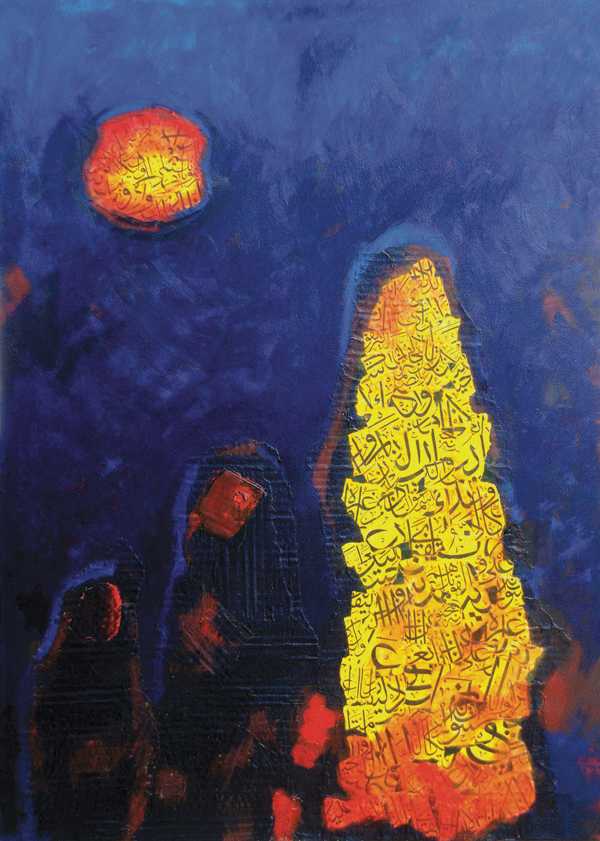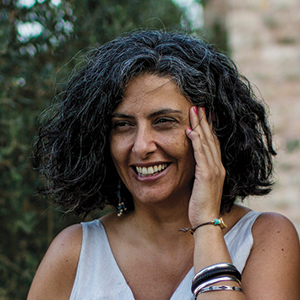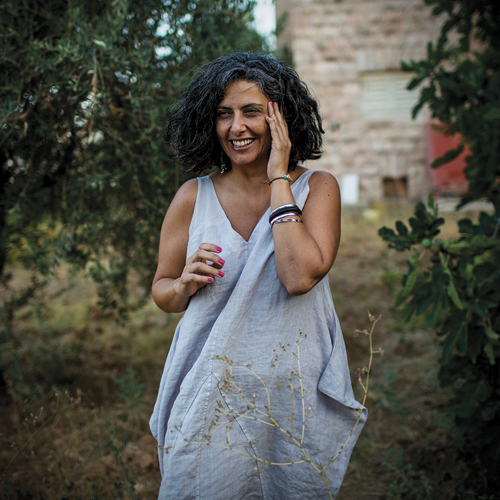Carol Sansour is an agitator, social-provoker, and campaigner who has an interest in post-national, post-gender, and post-religion identities. A proud mother and partner, she works and resides in Abu Dhabi. She can be reached at sansourcarol@gmail.com.
If the free-verse tradition represented by Mahmoud Darwish created a national poetry of Palestine – which remains an abstracted, ideational country, indistinguishable from the Palestinian cause – in stark and provocative contrast, Carol Sansour writes poetry that literally asserts: Palestine is not a cause.
In the acclaimed sequence of image-intense texts presented in In the Time of the Apricots, Carol Sansour makes no distinction between verse and prose or literary and vernacular registers of the language. She uses what is at her disposal, including Darwish’s legacy, to present the picture of a self, a human being, a woman who happens to be Palestinian. And in the process, she conflates two distinct concepts – the nation and the homeland – underlines the conflict between them (which her free-verse style glosses over), and thus evokes a gritty and credible place where people live unhindered by ideology or angst.
“It may be that the idea of Arab nationalism precisely is the idea of the state of Israel…”
Sansour’s Palestine is a place of nature and of intimacies, small things performing on small stages: the household, the church, “the swing on our high balcony”… Hers is a post-national discourse of belonging by necessity that, in its aesthetics of truth, speaks as eloquently to the human condition as the best free verse. Here, for real, is writing about love and flowers.
Based on a review by Youssef Rakha
In the Time of the Apricots (extracts)
(1)
Way in
Traffic lights
Posters
Separation wall
Jacir Palace
Amal Butchery
Azza Camp
Bread
United Nations Relief and Works Agency rubbish
New street
Building stones
Pebbles Sand Bulldozer
Graffiti
Cars cars cars
Restaurants restaurants restaurants
Monastery monks
Nativity guards
Tourist police
Violence
Security
Presidential palace
Bank
Sun
Lemon
Home
(6)
In the beginning were the apricots
The first home
Earth sizzling
Beetle crackles
In the time of the apricots
Early summer’s stories
of Platonic love
The alleyway: tired dogs
and annoying neighbours
In the time of the apricots
The mornings green, yellow
and honey hued
The itinerant ice cream vendor
calling out in the afternoon
The smell of burning sugar
Children playing in the dust
while my mother makes coffee
and milk and tea
My mother
Always my mother
The greatest infidelities
and the harshest losses
and the longest exile
In the time of the apricots
(12)
It may be that the idea of Arab nationalism precisely is the idea of the state of Israel
Artifice and project
It may be that the breakdowns we are witnessing are an occasion to reformulate who we are and what we are here to defend
But to be using those breakdowns to settle vengeful, tribal, nationalist scores
It may be that this is justification enough for all that is happening and will happen to us in the Arab world

(13)
As if since forever
we’d play “My Princess”
I make you up
and dress you in flowers and beads
then I take your picture
We’d sit on the swing on our high balcony
you holding the binoculars
I drunk on the view
We’d watch the roof of an imaginary lover named “His Arse is the Moon”
Pick anemones and yellow roses
You’d be barefoot
and in the grass we’d hide secrets
We’d go on talking until the cock, fed up of us, crowed
and the sun rose from the Dead Sea
Humidity moistened our blankets
You could gauge the magnitude of the topic from the size of the hillocks of pumpkin seed shells on the kitchen table and the rate of the shelling
The job: an ounce
The family: two ounces
Love: a kilo + chocolate bars
We would play “My Princess”
And I’d take your picture
(17)
We are all aware of the possibilities
His girlfriends consecrate their chests and their thighs for life should he appear
“My mother will be the most beautiful of refugees if we are forced to leave” he reminded them
The screens get smaller, the absurdity bigger
Down with the tyrant
(18)
An old hairdo
A mummy with garish nails
Verses in the same tone
Chairs that pay no attention to the size of the sitter
Weather likely to rain heavily
Broken traffic lights
A funnel of cigarettes
A book bored of stopping at the same page
Young men complaining of love
Satiety
Vomit
Redness in the eye
A pain that strikes the leg
Backside muscle convulsion
Tongue knot
Calling an emergency room that is asleep
A slutty virgin
A flower on abandoned land
Faeces in artesian wells
Tearing through a drum
Prostitute power
Religious bias
A search for a bedroom for a fille de joie
Bathing in a sea without waves
Drinking a cheap shot of whiskey on the sixty-third floor
Smiling at a reception
Arguing with a fool
It’s all prattle
(19)
Thus is the homeland at the dawn of every morning
The revolution will never start
(20)
I sold my soul to twenty merchants
who traded it for a rocket
locally manufactured
I sold it in return for pictures of a school being bombed
and mothers losing their minds
I sold my soul and saw only
repetitive copies of verses and sayings
that the devil would be ashamed of chanting
I sold it and I cursed all the applause and the wailing
while they were buying a rocket
to aim at my chest once I proclaim
that Palestine is not a cause
(21)
The mornings green, yellow
and honey hued
In the time of the apricots
The smell of burning sugar
Children playing in the dust
while my mother makes coffee
and milk and tea
My mother
In the time of the apricots
Always my mother
…………….
Translation by: Yousser Rakha, a complete version can be found at https://yrakha.com/2016/10/21/carol-sansour-in-the-time-of-the-apricots-selections/#more-16522.



